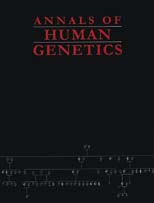Article contents
Influence of apolipoprotein E genotype variation on the means, variances, and correlations of plasma lipids and apolipoproteins in children
Published online by Cambridge University Press: 01 July 1999
Abstract
The impact of the three most common apolipoprotein E (APOE) genotypes (ε32, ε33, and ε43) on means, variances, and correlations of nine plasma lipid and apolipoprotein traits (total cholesterol, lnTriglycerides, HDL cholesterol, and apolipoproteins AI, AII, B, CII, CIII, and lnE) was studied in 212 unrelated female and 219 unrelated male children aged 5–21.5 years from 278 pedigrees ascertained without regard to health status from Rochester, Minnesota. There was significant heterogeneity (p[les ]0.05) among genotypes for the mean plasma levels of lnApo E, Apo CII, Apo CIII, and lnTriglycerides (lnTrig) in females, and for the means of lnApo E, Apo B, and total cholesterol (Total-C) in males. Significant heterogeneity of intragenotypic variance was observed in males for Apo CII, lnTrig, and HDL-C; no significant heterogeneity was observed in females. Pairwise correlations between traits differed significantly among APOE genotypes in both females (6 of 36 pairs) and males (5 of 36 pairs). These results differ from those obtained from studies of the parental generation from the same sample of pedigrees. Our study further demonstrates that, with the exception of mean lnApo E levels, the univariate and bivariate distributions of traits that are measures of lipoprotein metabolism are influenced by variation in the APOE gene in a gender- and generation-dependent manner.
- Type
- Research Article
- Information
- Copyright
- © University College London 1999
- 7
- Cited by




